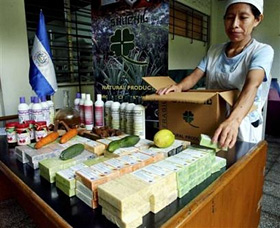 |
 |
 |
 Business News | January 2006 Business News | January 2006  
CAFTA Nations May Pay for Missed Deadline
 Juan Carlos - Associated Press Juan Carlos - Associated Press


| | Catalina Cruz, 35, who works at the Suchil Products which produces natural soaps, shampoos and marmalades for export to the U.S. markets, packs some products at the factory headquarters in San Salvador, El Salvador. The U.S. has announced that the implementation of the Central American Free Trade Agreement (CAFTA) won't begin on Jan. 1 as planned but will probably go into effect gradually in February or March. (AP/Luis Romero) |
Guatemala City - Six Latin American governments had hoped to start 2006 with a free trade zone that would open the U.S. market to their fledgling industries. Instead, they bogged down in making legal and regulatory reforms, delaying the trade union that was supposed to take effect Sunday.

Proponents of the Central America Free Trade Agreement CAFTA fear the delay will mean painful business and trade losses in a region of widespread poverty.

Countries that made extra investments in their products say the holdup postpones the long-anticipated payoff of access to U.S. markets for sectors such as the struggling textile and assembly-for-export industries.

"In Guatemala, we were planning on economic growth of 4.4 percent the most robust of the region thanks to CAFTA," said Juan Carlos Paiz, president of the Guatemalan Union of Nontraditional Products.

But the delay is good news for farm groups and others who fought the agreement, arguing it will ruin small producers and other local businesses. U.S. critics say the measure will cost American jobs, particularly in the sugar and textile industries.

"It's a victory, (although) a temporary one," said Jose Pinzon, secretary-general of the Guatemalan General Workers Federation.

President Bush signed the agreement with leaders of five Central American countries and the Dominican Republic in May and Congress ratified it in August.

All six countries must make "technical changes" in customs procedures and regulations regarding intellectual property rights, telecommunications and procurement, said Stephen Norton spokesman for the U.S. Trade Representative's Office.

Some countries must also formally eliminate tariffs and obstacles to investment.

Honduras, El Salvador and Guatemala are scrambling to meet the entry requirements by Feb. 1. Nicaragua says it probably won't join until March, while the Dominican Republic says it won't be ready until July 1.

Costa Rica still has not ratified the pact, and may not even join at all. Lawmakers aren't scheduled to debate the topic before February at the earliest.

"None of the Central American nations can begin because they haven't we haven't finished clarifying topics" with the U.S. government, said Guatemalan Economy Minister Marcio Cuevas.

Norton said U.S. officials were helping CAFTA nations prepare for the agreement's implementation and predicted they would be added on "a rolling basis."

"The implementation process should not be rushed," he said. "Otherwise the benefits of CAFTA to farmers, workers, businesses and consumers of the United States and of its CAFTA partners could be jeopardized."

Honduras has tackled most of the legal reforms, but President Ricardo Maduro must still approve a series of regulations needed for exporting agricultural products to the United States.

El Salvador's Congress has approved a package of reforms, and President Tony Saca is expected to sign them in early January.

Holiday vacations kept Guatemalan legislators from approving reforms, while in Nicaragua lawmakers are still hashing out intellectual property and copyright laws.

Paiz, of the Guatemalan Union of Nontraditional Products, blamed the United States in large part for the delay, saying Washington was requiring too much of its poorer partners.

"The United States isn't holding open or fair negotiations now," Paiz said. "What we signed was sufficient, and they shouldn't have to ask for more."

Associated Press writers Diego Mendez in El Salvador, Freddy Cuevas in Honduras, Filadelfo Aleman in Nicaragua and Marianela Jimenez in Costa Rica contributed to this report.

On the Net: Office of United States Trade Representative: http://www.ustr.gov | 
 | |
 |



